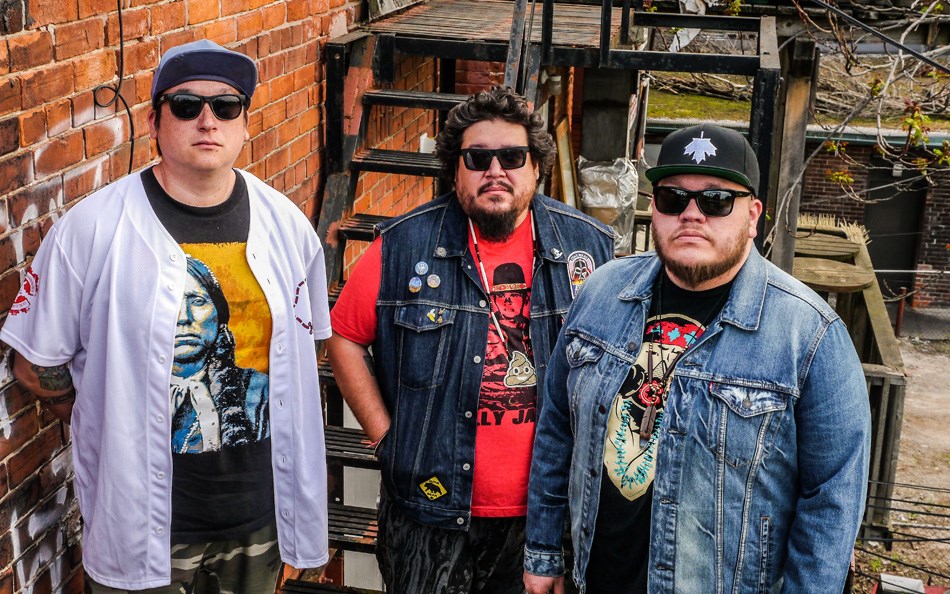“At the end of the day, if you really look at it, we’re just three guys who play club music to make people dance,” says Tim "2oolman" Hill of A Tribe Called Red during a phone call with Westender.
This is a humble outlook, given the musicians’ role as unofficial ambassadors for First Nations music and culturally progressive politics. Since forming in Ottawa close to a decade ago, A Tribe Called Red has made a name for itself by mashing up modern EDM with traditional pow wow music, and the members (Hill, Ian "DJ NDN" Campeau and Bear Witness) have eagerly embraced their role as community leaders. They’ve been vocal supporters of the protest movement Idle No More, and they’ve helped to combat ignorance by decrying non-indigenous fans who wear headdresses and war paint to concerts.
“The moment that we’re born –especially a native person – we’re born into politics,” Hill asserts. “We’re born political right away, because we’re not supposed to be there. We were supposed to be gone. When we do something with ourselves –whether it’s being a doctor or a lawyer or a musician —there’s always a duty on us to speak out against things that are happening in our community.”
A Tribe Called Red has been spreading its message for close to a decade, in the process becoming one of Canada’s most celebrated indie dance acts. They’ve been nominated for the Polaris Music Prize twice, won the 2014 Juno Award for Breakthrough Group of the Year, and collaborated with prominent American hip-hop artists Das Racist and Angel Haze.
Being in the spotlight is still a relatively new experience for Hill, who joined the group in 2014 as a replacement for prior member DJ Shub. Even before officially joining the lineup, Hill had already established an artistic rapport with A Tribe Called Red.
“Back when I wasn’t in the group, I was still collaborating with them,” Hill explains. “It’s always been that way. We always hung out with each other whenever we were around – whether it be at a festival or South by [Southwest] or something like that. I was always around. We basically just ran into each other all the time and it just made it much easier to work [together].”
Following the lineup change, the trio issued a series of short-form releases: 2014’s politically charged single “Burn Your Village to the Ground,” 2015’s wrestling-themed Suplex EP, and the recent track “Stadium Pow Wow.” Hill’s first full-length as a member of the group, We Are the Halluci Nation, is due out next month.
“The sound, if anything, matured a little bit more,” Hill sats. “The record is a conceptual record with a ton of collaborators from indigenous peoples all over the world, not just pow wow. We had to grow and come out of what we’re used to and build something brand new that we haven’t done yet.”
The 15-song LP is a rich, sprawling tapestry of sounds and influences that features a host of prominent guest contributors, including indigenous artists from around the world and rap artists like Shad and Saul Williams. Yasiin Bey (AKA Mos Def) spits incendiary verses on the juggernaut single “R.E.D.,” which mixes traditional chants with a vicious hip-hop swagger akin to Yeezus-era Kanye West. The newly unveiled “Sila” features renowned throat singer Tanya Tagaq, whose growls and gasps meld with a syncopated assault of pounding beats.
“It’s definitely been one of the most intricate production projects that I’ve ever been a part of,” Hill says of the album. “It’s pulling together different genres, different cultures, different speeds, BPMs, drum patterns – everything was different, and it’s just been a complete blessing to work with everybody that we got a chance to.”
The album’s mosaic of cultural influences is tied together by the concept of the “Halluci Nation,” an idea that comes from poet and activist John Trudell, who contributed spoken word poetry to the sessions before his death in 2015. The Halluci Nation, Hill says, is not exclusive to indigenous peoples, but belongs to anyone interested in rejecting ignorance and uniting as one.
“It’s basically for people who want to change things and who want to speak up, or at the very least get together,” Hill says. “The Halluci Nation isn’t ours — it really comes from John. We’re just a part of it, just like everyone else.”
With We Are the Halluci Nation, A Tribe Called Red is continuing in its mission to get audiences dancing while also educating them about North America’s deep-seated racism. Although Hill acknowledges that there is still a lot of work to be done, he sounds optimistic when discussing the progress of recent years.
“It’s very, very heartwarming to me to see people wanting to educate themselves. The internet is a great thing for people who are ignorant,” he says. “It’s 2016. We’re woke to how things are. There’s a lot of conversations being had right now, and it wouldn’t be possible without Twitter and all that kind of stuff, so it’s awesome.”
• A Tribe Called Red performs at the PNE Forum on Wednesday, Aug. 31, at 8:30pm as part of the PNE’s Summer Nights Concert Series. Free with PNE admission, or reserved seating from $20 at TicketLeader.ca.


